
INTRODUCTION
Let us go out early to the vineyards, and see whether the vines have budded, whether the grape blossoms have opened and the pomegranates are in bloom. There I will give you my love. Song of Solomon 7 v 12

HISTORY
The modern name pomegranate (punicum granatum) derives from the Latin pomus (apple) and granatum (grained, seeded). Pomegranates are believed to have originated in Persia (modern Iran) and the Himalayan region, and have been cultivated and held in high regard for thousands of years. In Biblical texts pomegranates are included in descriptions of an idyllic land: For the Lord your God is bringing you into a good land of wheat and barley, of vines and fig trees and pomegranates, a land of olive trees and honey (
Deuteronomy 8 v 8). Islamic literature includes pomegranates in descriptions of Paradise, and some believe that the apple in the Garden of Eden was in fact a pomegranate. The pomegranate was one of the first fruits to be cultivated, and its uniqueness surely must have helped it spread rapidly through the Middle East and to Egypt, where it was associated with life after death and included in tomb offerings. King Tutankhamun was buried in the 14th century BC with a beautiful pomegranate-shaped silver vase, and depictions of pomegranates can be seen in tomb paintings and sculptures.
Archaeological evidence shows that the pomegranate was known in ancient Greece 4000 years ago. Excavations at Bronze Age Mycenae and Akrotiri have revealed pomegranate imagery in jewellery, paintings and on pottery. It was revered in mythology as symbolizing eternal love, most famously in the myth of . Homer refers to the pomegranate dangling out of reach above the head of Tantalus, who is cursed for all time by being unable to eat or drink. Discorides, the Greek physician, included pomegranates in remedies for stomach disorders, earache and more, in his De Materia Medica, written in the 1st century AD and used as a standard reference work for over a thousand years. The Romans called pomegranates malum Punicum (Punic apple) a reference to their supposed arrival from Carthage.
They were recognised as having health benefits, and the Roman writer Pliny lists no less than 26 uses for them, including treating morning sickness, loose teeth, ulcers and chilblains! Burning the rind, he adds, can help repel insects. Pomegranates spread across Europe and by the 14th century are included in a recipe in one of the earliest medieval cookbooks, Liber de Coquina. The Spanish city of Granada was named after the pomegranate, and images of the fruit can be seen everywhere in the city on signs, fountains, architecture even on manhole covers! The Spanish explorers introduced the pomegranate, with many other fruits, to the New World, and it spread inland with the settlers who followed. Toribio Motolina, a Spanish friar who was sent to Mexico in the early 16th century, described how the Spanish were using grafting to introduce new fruits including the pomegranate. Thriving in hot climates, the fruit settled well into its new environment. It is believed that the pomegranate arrived in England in the mid-16th century during Henry VIIIs reign, and Henry and Katherine of Aragon combined the Tudor rose with the pomegranate of Granada as a sign of their union.
By Victorian times it was primarily regarded as an ornamental tree or a medicinal plant, with remedies using the pulp and the bark. Today, the pomegranate is still regarded as an unusual and exotic addition to our fruitbowls, but one which deserves to be appreciated, not only for its appearance, but for its beautiful taste and its health benefits.  HEALTH BENEFITS The health benefits of pomegranates are so impressive that in 1546 the Royal College of Physicians included a golden pomegranate in its coat of arms, probably in recognition of the fruits historic connection with health. Although they are rich in many vitamins and minerals, including Vitamin B6, copper, manganese, and phosphorus, the main benefit of pomegranates is their amazingly high antioxidant content. Pomegranates contain three types of polyphenols, including two unique antioxidants, namely punicalagin, which makes up around half the antioxidant qualities, and punicic acid, both of which are hugely beneficial to health. They have been shown in studies to have powerful anti-cancer properties, especially in relation to prostate cancer. These antioxidants are also thought to be good for your heart by lowering blood pressure and keeping arteries clear, thus facilitating good blood flow.
HEALTH BENEFITS The health benefits of pomegranates are so impressive that in 1546 the Royal College of Physicians included a golden pomegranate in its coat of arms, probably in recognition of the fruits historic connection with health. Although they are rich in many vitamins and minerals, including Vitamin B6, copper, manganese, and phosphorus, the main benefit of pomegranates is their amazingly high antioxidant content. Pomegranates contain three types of polyphenols, including two unique antioxidants, namely punicalagin, which makes up around half the antioxidant qualities, and punicic acid, both of which are hugely beneficial to health. They have been shown in studies to have powerful anti-cancer properties, especially in relation to prostate cancer. These antioxidants are also thought to be good for your heart by lowering blood pressure and keeping arteries clear, thus facilitating good blood flow.
They can also help with lowering cholesterol. The antioxidants and flavonoids in pomegranates have been shown to benefit brain nerve cells, thus protecting against memory loss in diseases such as Alzheimers. Pomegranates are good for your mood as they contain oestrogen, and may also stimulate serotonin receptors. Their potassium content is also good for fighting depression, as well as being good for digestion. Our digestive systems also benefit from the high-fibre content of pomegranates.  Pomegranates contain high amounts of Vitamin K, which is good for bones and helps with blood clotting, as well folate which protects against birth defects.
Pomegranates contain high amounts of Vitamin K, which is good for bones and helps with blood clotting, as well folate which protects against birth defects.  Pomegranates contain high amounts of Vitamin K, which is good for bones and helps with blood clotting, as well folate which protects against birth defects.
Pomegranates contain high amounts of Vitamin K, which is good for bones and helps with blood clotting, as well folate which protects against birth defects.
Folic acid has also been shown to decrease the risk of stroke. Pomegranates are even good for oral health as they have been shown to reduce the build-up of plaque in your mouth. The sugar content in pomegranates is quite high, but luckily you only need a very small amount to get all the health benefits. We should be including pomegranate in our diet every day!

RECIPES
In the dense foliage of the inner garden Pomegranates like bright green stone, And barbed, barbed with a crown. Oh, crown of spiked green metal Actually growing! D.H. Lawrence Pomegranate (1923) BREAKFAST
SMOOTHIES Pomegranates are incredibly rich in antioxidants, and in these recipes are paired with berries which are similarly endowed, to give your immune system a super-charged boost!

SERVES: PREPARATION: 5 MINUTES



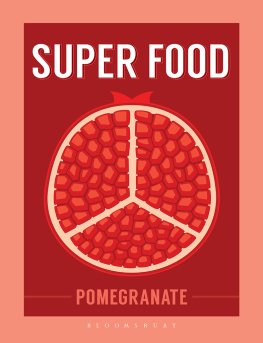


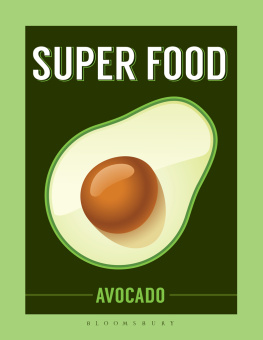
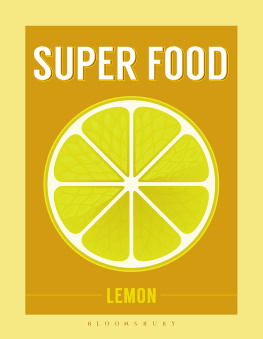
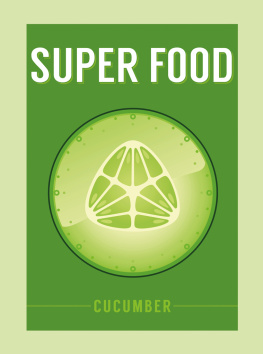
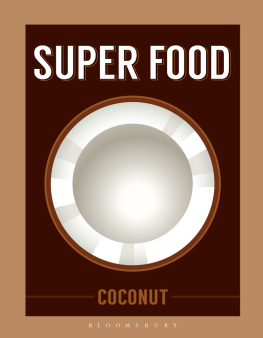






 C ONTENTS
C ONTENTS
 INTRODUCTION Let us go out early to the vineyards, and see whether the vines have budded, whether the grape blossoms have opened and the pomegranates are in bloom. There I will give you my love. Song of Solomon 7 v 12
INTRODUCTION Let us go out early to the vineyards, and see whether the vines have budded, whether the grape blossoms have opened and the pomegranates are in bloom. There I will give you my love. Song of Solomon 7 v 12  HISTORY The modern name pomegranate (punicum granatum) derives from the Latin pomus (apple) and granatum (grained, seeded). Pomegranates are believed to have originated in Persia (modern Iran) and the Himalayan region, and have been cultivated and held in high regard for thousands of years. In Biblical texts pomegranates are included in descriptions of an idyllic land: For the Lord your God is bringing you into a good land of wheat and barley, of vines and fig trees and pomegranates, a land of olive trees and honey (Deuteronomy 8 v 8). Islamic literature includes pomegranates in descriptions of Paradise, and some believe that the apple in the Garden of Eden was in fact a pomegranate. The pomegranate was one of the first fruits to be cultivated, and its uniqueness surely must have helped it spread rapidly through the Middle East and to Egypt, where it was associated with life after death and included in tomb offerings. King Tutankhamun was buried in the 14th century BC with a beautiful pomegranate-shaped silver vase, and depictions of pomegranates can be seen in tomb paintings and sculptures.
HISTORY The modern name pomegranate (punicum granatum) derives from the Latin pomus (apple) and granatum (grained, seeded). Pomegranates are believed to have originated in Persia (modern Iran) and the Himalayan region, and have been cultivated and held in high regard for thousands of years. In Biblical texts pomegranates are included in descriptions of an idyllic land: For the Lord your God is bringing you into a good land of wheat and barley, of vines and fig trees and pomegranates, a land of olive trees and honey (Deuteronomy 8 v 8). Islamic literature includes pomegranates in descriptions of Paradise, and some believe that the apple in the Garden of Eden was in fact a pomegranate. The pomegranate was one of the first fruits to be cultivated, and its uniqueness surely must have helped it spread rapidly through the Middle East and to Egypt, where it was associated with life after death and included in tomb offerings. King Tutankhamun was buried in the 14th century BC with a beautiful pomegranate-shaped silver vase, and depictions of pomegranates can be seen in tomb paintings and sculptures.  HEALTH BENEFITS The health benefits of pomegranates are so impressive that in 1546 the Royal College of Physicians included a golden pomegranate in its coat of arms, probably in recognition of the fruits historic connection with health. Although they are rich in many vitamins and minerals, including Vitamin B6, copper, manganese, and phosphorus, the main benefit of pomegranates is their amazingly high antioxidant content. Pomegranates contain three types of polyphenols, including two unique antioxidants, namely punicalagin, which makes up around half the antioxidant qualities, and punicic acid, both of which are hugely beneficial to health. They have been shown in studies to have powerful anti-cancer properties, especially in relation to prostate cancer. These antioxidants are also thought to be good for your heart by lowering blood pressure and keeping arteries clear, thus facilitating good blood flow.
HEALTH BENEFITS The health benefits of pomegranates are so impressive that in 1546 the Royal College of Physicians included a golden pomegranate in its coat of arms, probably in recognition of the fruits historic connection with health. Although they are rich in many vitamins and minerals, including Vitamin B6, copper, manganese, and phosphorus, the main benefit of pomegranates is their amazingly high antioxidant content. Pomegranates contain three types of polyphenols, including two unique antioxidants, namely punicalagin, which makes up around half the antioxidant qualities, and punicic acid, both of which are hugely beneficial to health. They have been shown in studies to have powerful anti-cancer properties, especially in relation to prostate cancer. These antioxidants are also thought to be good for your heart by lowering blood pressure and keeping arteries clear, thus facilitating good blood flow. Pomegranates contain high amounts of Vitamin K, which is good for bones and helps with blood clotting, as well folate which protects against birth defects.
Pomegranates contain high amounts of Vitamin K, which is good for bones and helps with blood clotting, as well folate which protects against birth defects.  SERVES: PREPARATION: 5 MINUTES
SERVES: PREPARATION: 5 MINUTES 
